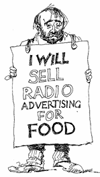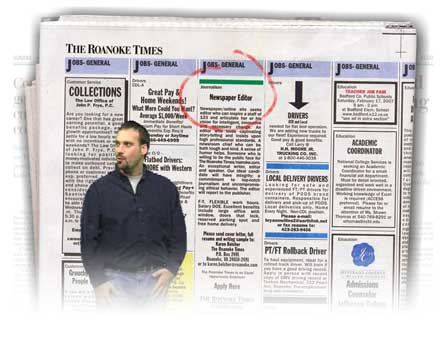 That’s the prediction of Google Audio national director of sales Drew Hilles tells Inside Radio “Our main goal is to draw new advertisers to radio” and when they do that’ll put pressure on inventory and result in higher rates for all buyers. The onetime CBS Radio exec says “our goal is to raise rates” and return the sector to double-digit growth. He says one way they help preserve a station’s rate card integrity is by allowing buyers to pick markets — but not individual stations. And Hilles says “stations have control of the throttle of how much of the inventory they open up or not.” Hilles says Google is working to attract some of its existing 100,000 advertisers who have found radio too tough to buy. Hilles says what attracts them is the “more Googley way” they sell radio that affords buyers more accountability and trackability. Google says “a large amount” of the advertisers are new to radio. [INISIDE RADIO]
That’s the prediction of Google Audio national director of sales Drew Hilles tells Inside Radio “Our main goal is to draw new advertisers to radio” and when they do that’ll put pressure on inventory and result in higher rates for all buyers. The onetime CBS Radio exec says “our goal is to raise rates” and return the sector to double-digit growth. He says one way they help preserve a station’s rate card integrity is by allowing buyers to pick markets — but not individual stations. And Hilles says “stations have control of the throttle of how much of the inventory they open up or not.” Hilles says Google is working to attract some of its existing 100,000 advertisers who have found radio too tough to buy. Hilles says what attracts them is the “more Googley way” they sell radio that affords buyers more accountability and trackability. Google says “a large amount” of the advertisers are new to radio. [INISIDE RADIO]
Tag Archives: advertising
Most creative media job posting ever

Lost Remote points us to this very clever and effective job posting (for an editor) at The Roanoke Times.
Now, compare that to the job listings at your company. Or my company. Can we do more creative ads? Absolutely. But nobody has ever asked for one. Would we get better candidates with postings like this? Maybe.
Adding interesting ads to mediocre products
Couple of bullets from a podcast with Seth Godin, during which he talks about ad agencies;
“What ad agencies ought to do, in my opinion, is not focus on selling ads anymore. And instead, focus on getting in deeper within the clients, and help the clients make products that people want to talk about.”
“The problem is that ad agencies have defined themselves as the people who take the mediocre products and add interesting ads to them, and washed their hands and say, we can’t do anything about what the factory brings us. And my answer is, of course you can, and the clients actually want you to, you’re just not working hard enough to get that piece of business.”
[via Learfield InterAction]
Okay, how about some bonus spots?
Betsy Lazar –Executive Director of Advertising and Media Operations at GM– gave a keynote at the rcent Radio Advertising Bureau conference in Dallas. According to INSIDE RADIO, she was pretty specific in her advice to broadcasters;
“…doing business the old way won’t cut it. Pitching schedules of :30s won’t do it. What GM wants is ideas that show involvement by the station. Things that come from mining the listener database and exploiting the station website in fresh ways.”
Ad Age reports that GM “slashed ad spending by more than $600 million last year, a drop so stunning it should convince even the staunchest doubters that the age of mass-media marketing is going the way of the horse and buggy.”
In that same issue of INSIDE RADIO: Bank of America analyst Jonathan Jacoby admits his survey of 34 industry pros last week in Dallas is not statistically significant. But he says 43% of them (14-15 people) said they’ve “used or plan to use Google/dMarcto sell airtime.”
Isn’t this called “Public Access Television?”
A small television station in Santa Rosa, CA (KFTY-TV) has canceled its nightly newscasts…fired most of its editorial staff… and is soliciting programming from locals — from independent filmmakers to teachers and politicians. According to station managers, the newscast wasn’t a hit with advertisers. Media execs nationwide are watching to see if the the Clear Channel property can make money from citizen-generated stories that will begin airing within a few months.
Gutsy or stupid…time will tell. Hard to imagine how bad things would have to be (ratings, sales, etc) before this would seem like a viable option.
MySpace makes $25 Million a month in ads
That’s the word from Rupert Murdoch’s keynote interview at the McGraw-Hill Digital Media Summit in New York yesterday. And that number is growing at a rate of 30% per quarter.
dMarc founders leave Google
Looks like Google’s plans to reinvent the way radio ads are bought has hit a rough spot. Online Media Daily reports Chad and Ryan Steelberg, the founders of dMark, an automated radio ad placement company purchased by Google in January 2006, have left the company.
The brothers resigned amid reports of growing tension between dMarc, the company they founded, and Google over differing approaches to radio ad sales. There was also said to be tension over the limited remuneration dMarc could expect under the performance-based terms of its original deal with Google.
Sheryl Crow reads (and plugs) the Wall Street Journal
“Adventures in Capitalism” was the tag line for The Wall Street Journal’s previous ad campaign, in 1997, to promote the brand. The paper was recently made over — taking three inches from the width and adding an emphasis on forward-looking journalism — so it’s time to freshen up with a new campaign. [MSNBC] “Every journey needs a Journal,” says the new tag line, positioning the paper to speak less to readers’ inner Striver than their inner Seeker.
The ad blitz — which begins next week in major publications and Web sites — are essentially celebrity endorsements, highlighting the Journal’s role in the inspiring “life journeys” of a diverse mix of people including singer Sheryl Crow, “Freakonomics” coauthor and University of Chicago professor Steven Levitt and Jack Burton, founder of Burton Snowboards.
The Journal wanted people who weren’t megafamous but who “had an interesting life journey, read The Wall Street Journal and were successful.” Ping me if you spot one of these ads.
Get A Mac: Surgery, Sabotage, and Tech Support
 In the first new Mac ad, PC is getting surgery in order to receive all sorts of upgrades to run Windows Vista. Tech Support involves the PC receiving a camera upgrade (via masking tape to the head) so that he can do important business things like videoconference, only to find out that Macs come with built-in iSights now so they don’t need to upgrade. In Sabotage, the PC has decided to sabotage the commercial altogether and replace the Mac with another actor who says everything the PC wants him to say. [Infinite Loop]
In the first new Mac ad, PC is getting surgery in order to receive all sorts of upgrades to run Windows Vista. Tech Support involves the PC receiving a camera upgrade (via masking tape to the head) so that he can do important business things like videoconference, only to find out that Macs come with built-in iSights now so they don’t need to upgrade. In Sabotage, the PC has decided to sabotage the commercial altogether and replace the Mac with another actor who says everything the PC wants him to say. [Infinite Loop]
The men and/or women responsible for writing these commercials are the very same people that played Keep-Away with the fat kid’s hat a lunch time in the 7th grade. Until he cried.
Google deal with CBS Radio imminent?
Merrill Lynch broadcast analyst Jessica Reif Cohen expects Google will team with a CBS Radio in a wide-ranging advertising deal. In a nutshell, Google would allow advertisers to bid for radio airtime using some of the same functionality as its online sales tool. But again, no deal has been announced.
Cohen estimated that a Google deal to sell 10% of CBS Radio’s advertising inventory would generate approximately $200 million in revenues and that the upside for CBS would be two-fold: “1) attracting new (likely smaller) advertisers to its platforms a la Google’s experience with search, and 2) creating a more efficient sales model that reduces the friction/cost of selling advertising.” [LostRemote]
